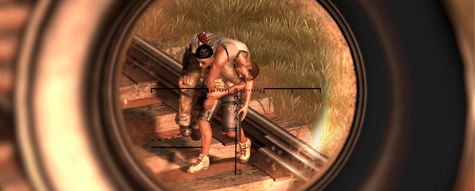John Lanchester has an article in the 1st January 2009 edition of the LRB on games. It shares a title with this post, and I went into it a little apprehensive, with my deflector shields up. I like Lanchester as a writer, but was fearing yet another piece (be it inside or outside the traditional gaming press) touching the old “is it art and can we have a cookie yet?” chestnut. The best responses to that question are not “Yes” or “No” but themselves questions: “Does it matter?”; “Does it have to be?”; “What do you mean by art?”; “What if it is?”
For much of the article, Lanchester avoids that and takes a more interesting tack: he wants to write a smart, balanced piece about gaming for a by-and-large non-gaming audience (the readers of the London Review of Books):
Books, films, TV, dance, theatre, music, painting, photography, sculpture, all have publics which either are or aren’t interested in them, but at least know that these forms exist, that things happen in them in which people who are interested in them are interested. They are all part of our current cultural discourse. Video games aren’t. Video games have people who play them, and a wider public for whom they simply don’t exist. (The exceptions come in the form of occasional tabloid horror stories, always about a disturbed youth who was ‘inspired’ to do something terrible by a video game.) Their invisibility is interesting in itself, and also allows interesting things to happen in games under the cultural radar.
And from that point, he takes a whistle-stop tour of some recent highlights in games – talking about Bioshock’s take on Rand’s Objectivism, Miyamoto’s take on “fun”, the lure of having agency, and what creativity in games now looks like (among other things).
I’m not sure I agree with everything he says, and I think that’s OK – he’s not forcing his opinion onto anyone else. What he is doing is talking about games in a smart, informed, and adult way for an audience that values all of those things except, perhaps, the games themselves. More than that, he writes in a style that is suitably anecdotal in places: he has clearly played the games he writes about, and that, to my mind, is hugely important.
When, at the end, Lanchester says
It seems clear to me that by the time my children are adults, video gaming will be a medium whose importance and cultural ubiquity are at least as great as that of film or television.
he’s not just talking as a cultural critic and father; he’s talking as a gamer himself. At the end, he suggest that we might, if things go right, see a “new art form” emerging. I’m not sure what he thinks it currently is, but given the comparison to Film and TV, he might dismiss it as a “communications medium” or some kind of similar terminology; I don’t know, but I think the word “art” is being used a bit too perjoratively there.
As such, that feels a little reductive to me; scattered throughout the past 30 years of gaming, there are many examples that show we’re already there. There might not be a defining “starting point”; it might become clear long after the fact, but right now, in the middle of it all, it’s much harder to assign dates and times to things.
An article titled “is it art?” was always end up going that way; perhaps that’s as much an editorial pressure as an authorial impulse. I could certainly take or leave some of the conclusions. But a lot of Lanchester’s premise and exposition is really good, solid stuff, and it’s exciting to see this kind of thing in mainstream, critical language in a mainstream, critical publication. On balance, whatever you think of the art discussion being dredged up again, this time into the LRB, or Lanchester’s opinion, the article itself is very much worth your time. Like the best writing, it’s not about what it says; it’s about the ideas you’ll have reading it, the avenues it’ll lead you down.
